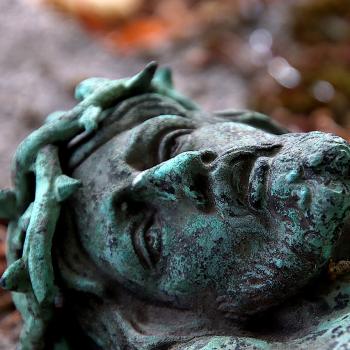Reclaiming Something Good from a Deeply Flawed Religious Heritage
I was tempted to title this blog essay something like “My experience of ‘second naivete’.” But I was afraid that would send potential readers running scared. I don’t know how many people know what is meant by “second naivete.” I learned the concept from philosopher-theologian Paul Ricouer, but perhaps he learned it from someone else.
A second naivete is the experience of being able to appreciate something one has before discarded as worthless—usually something religious. So I go on…
I grew up in a religious form of life (to use language borrowed from sociology) with which most people are unfamiliar. However, if you ever saw the movie “The Apostle” starring Robert Duvall, you have a glimpse, at least, of the religious form of life in which I grew up. There are differences between mine and the one depicted in the movie, but underneath the differences there is greater similarity.
We were “Full Gospel Christians” who reluctantly admitted to being “Pentecostal” although that was sort of an outsider’s term for us. We were not “charismatics”—although some of us became charismatics once the charismatic movement was already losing steam. I sometimes describe my home churches (two in succession in different cities) as “Urban Amish.” We lived and worshiped in the city, near “downtown,” in urban neighborhoods, but we were as distant culturally from the cultural centers of those cities as possible. We drove cars, but eschewed “conspicuous consumption.” We were reluctant about technology but eventually adopted some of it. We resisted trends and fashions and all “worldliness” including all science except medicine when necessary.
Our people were “the salt of the earth”—hard working people (when possible) but not sophisticated in any way. We took the Bible literally—as much as we thought possible. We had no theology, but we had doctrines. But we did not focus on doctrines; we focused on Jesus. Our communal life was centered solely around Jesus—not America, not upward mobility, not middle class values, not education, not suburban lifestyles, not popular culture. The only music allowed in our home was “sacred” and “gospel” music—records and radio.
*Sidebar: The opinions expressed here are my own (or those of the guest writer); I do not speak for any other person, group or organization; nor do I imply that the opinions expressed here reflect those of any other person, group or organization unless I say so specifically. Before commenting read the entire post and the “Note to commenters” at its end.*
I will argue that we were not even fundamentalists. “Fundamentalism” implies at least some degree of thought about religious matters. Our form of life was more controlled by reflex and intuition than by thought. “Distancing thought” that led to critical questioning was not even considered as possible within and among us. We had no system of theology. We had a formal Statement of Faith, but few read it or knew of it. Our pastors attended Bible institutes (later called colleges) that were centers of indoctrination and training in leading within our religious form of life.
Yes, we considered ourselves “evangelicals.” At least our denominational leaders and pastors did. But few of our lay people would even have known what that meant. If asked, they would have descried “us” as “Full Gospel Christians.” “Full Gospel” meant that we believed in and practiced the full range of the New Testament “gifts of the Spirit.” Our worship services were unplanned—except in a general way by the pastor. Often they included or concluded with long periods of intense communal prayer including speaking in tongues, interpretation of tongues, prophecy and prayers for healing the sick. Occasionally someone fell down (“slain in the Spirit”) in a kind of spiritual ecstasy of what was believed to be immediate communion with God in the Spirit. Sometimes a person would “dance in the Spirit.” Usually the sermon was not written out but more or less extemporaneous—and long.
This (above) only begins to describe it—my childhood and youth religious form of life.
What happened to you (me)? You might ask. I don’t know—except that somewhere along the way I began to think and ask and wonder and seek—some kind of intellectual framework within which to fit all of this experiential Christianity. I explored my father’s pastoral library. I read books about religion and the Bible and other denominations and in high school became involved in an organization called Youth for Christ where I learned that there were “other Christians” besides “us.” Eventually I was “invited” to leave the religious form of life of my childhood and youth because I asked too many questions and wrong questions. And I began to express doubts about some of our key doctrines such as “the rapture” and “speaking in tongues as the ‘initial, physical evidence’ of the Baptism of the Holy Spirit.”
One very specific turning point for me was a long conversation I had with my uncle who was president of our little denomination and also a member of the national board of the National Association of Evangelicals. I knew that he knew that there was a “wider world” of evangelical Christians of which we were somehow a part and that it included Spirit-filled Christians who never spoke in tongues. I asked him if Billy Graham was Spirit-filled. He said he had to be. I said that the evangelist had just published a book about the Holy Spirit in which he said he had never spoken in tongues. My uncle said “Well, then, he’s the exception.” I asked if I could teach that there are exceptions to our distinctive doctrine—should I stay within the denomination and teach in one of its Bible colleges. He said curtly “no.”
For years I struggled inwardly because I had been expelled from my own extended family—our denomination of about 300 churches. Many of my aunts and uncles were missionaries and until I was sixteen or so I really didn’t know which missionaries of our denomination were “blood related” and which were not. Our denomination was more “family” than my sixty-five first cousins and their parents!
For nearly forty-five years now I have been working and worshiping within the larger American evangelical community—mostly among Baptists of different kinds (all evangelicals of some kind). I have climbed the ladder of evangelical academic success—having written many books published by major publishing houses, having served as lead editor of a major evangelical journal, having served as contributing editor of Christianity Today magazine, having taught in three evangelical institutions of higher education, etc.
Throughout much of that four decades plus some years I have tended to look down my nose on the unsophisticated religious form of life of my childhood and youth. And yet, in the last few years especially I have been able to reclaim some aspects of it and even think fondly of them. Not the extreme legalism (no reading comic book except religious ones!) or abusive authoritarian leadership (you’re demon-possessed for asking that critical question). Not everyone in our denomination was like that, but too many were. (Once, just before I finally left, while I was a student at a Baptist seminary, I was publicly berated in a convention plenary session for daring to say from the platform that we need to be cautious about thinking that we can legislate morality.)
What might I reclaim from that really very strange religious form of life? (I say “really very strange” only to most white Americans. I think many black and Hispanic Americans wouldn’t find it that strange—especially the aspects of it I now look back on with some fondness.)
I well remember that even as a child and teenager I never resisted going to church. Church was fun, fascinating, exciting, invigorating, sustaining, meaning-giving, never boring. I do not mean “entertaining.” I mean that there was something almost tangibly spiritually real happening there. We actually felt God in worship. I know there’s no way to explain that in words; you really had to have been there. (I’m sure some of you can testify to that!)
Also, church-as-family meant I had an extended family to take care of me when my mother died when I was a child. My brother and I moved in with a foster family who were members of our church. I don’t know if there was any social worker involved or if the county paid them or what. But they were not just an ordinary foster family; they were “our people” and they took us in and nurtured us in a way no ordinary foster family could or would have. When my father remarried we took in foster children for periods of time. They were often “MKs”—missionary kids who had no home of their own while their parents were “itinerating” to raise money in churches. But sometimes they were children abandoned by their parents—until more permanent foster homes could be found for them.
Church for us was not an appendage to “real life.” It was our real life. It was our extended family. We ate together—frequently. We visited in each other’s homes—frequently. We spent many, many hours at church doing a variety of things including practicing for denominational youth events with music and Bible quizzes, etc. Our whole life centered around church. But even more our whole life centered around Jesus. Jesus was our God. Yes, we believed in the Trinity, but functionally we were “Jesus only.” Most of our church songs were about Jesus. Jesus was our friend, our brother, our savior, our lord, our healer, our coming king. A frequent question asked between “brothers and sisters” was “How are things between you and Jesus?” That was our way of asking if a person’s spiritual life was in order. Before we got in the car for a trip, however long or short, one parent would “plead the blood of Jesus” over the car for our safe journey.
Much of that seems strange to me now, of course, but I do miss the warmth of it all, the closeness and safety of it. There was no fear of death among us. We knew that death was “no big deal” as one gospel song said. It was just the doorway into life with Jesus in heaven.
Now, none of this is meant to endorse everything about that religious form of life. There was abuse in it—because you were not allowed to challenge authority. There was corruption in it for the same reason. There was no room for critical thinking or asking questions and some of what was taught and preached was pure nonsense. “Touch not God’s anointed” was a favorite Bible quotation taken out of context and used to protect leading religious authorities who were obviously living corrupt lives and talking nonsense such as their ability to “command angels.”
My disengagement from that form of life was extremely painful and I bear the scars of it. I was one of the first people of our denomination to attend seminary which was routinely referred to as “cemetery”—“where faith goes to die.”
One incident will illustrate the pain of my departure. While I was in seminary I served as assistant pastor within one of our denomination’s churches. It was actually the church of my teen years. I had gone away to college but come back to serve on the church staff while I attended seminary. Strangely, the church tolerated my attending seminary but did not appreciate it when I attempted to interpret the Bible using things I learned there. As youth pastor I took our large company of teens to the same “Bible camp” I had attended as a teenager. Now I was there as “one of the pastors.” One afternoon I sat in the dining hall during “recreation time” listening to other pastors, mostly older ones, talk about the Bible and the meaning of “salvation.” One or two of them were spouting heresy. I kept my mouth shut until one offered up a blatant misinterpretation of a biblical text. I gently corrected him. Immediately all of them got up from the table and walked away from me. I had stepped out of my place. It wasn’t just that I was younger; it was that I was bringing into the fellowship “outside influences”—especially from a non-Full Gospel source (a Baptist seminary).
Not once during my three years in seminary, while serving as assistant and youth pastor in one of “our churches,” did I receive even the faintest note of support or appreciation from any denominational leader. And then, when I made clear my intention to pursue a Ph.D. in Religious Studies at a major secular research university, I was indirectly told to leave the denomination—by my own uncle, president of it. By that time I knew that was right. I didn’t belong anymore. I was serving as youth pastor of a Presbyterian church and attending a Vineyard Fellowship church on Sunday evenings. (Our denomination had no church in that state at that time.) I put out “feelers” to several other Full Gospel fellowships and was roughly turned away. Baptists welcomed me with open arms.
But all along, as a proud Baptist, I have missed the raw emotion (tears in worship) of my Full Gospel upbringing. Also the excitement of worship but most of all the intense feeling of Jesus beside me. Yes, he is still beside me, but that language is not used as much or with as much feeling among “my Baptists.”
Mostly now I “feed” my “need” for something of that childhood and youth religious form of life by listening to “those songs” purchased on Itunes and downloaded to my Ipod or Iphone. It seems that nobody sings them anymore—and only Keith and Kristen Getty and Stuart Townend write similar songs and hymns. Once in a great while one of “my songs” will be sung in the Baptist church I attend.
Recently here I wrote an essay about who died on the cross and I said “God died.” Then I was reminded of a song we sang in the church in which I grew up almost every time we celebrated communion: “The Healer.” It includes the words “in great sorrow He died, the giver of life was He….” Please do me a favor and look it up on Youtube and listen to it. Something of the religious form of life I grew up in just might manifest itself to you through that.
*Note to commenters: This blog is not a discussion board; please respond with a question or comment only to me. If you do not share my evangelical Christian perspective (very broadly defined), feel free to ask a question for clarification, but know that this is not a space for debating incommensurate perspectives/worldviews. In any case, know that there is no guarantee that your question or comment will be posted by the moderator or answered by the writer. If you hope for your question or comment to appear here and be answered or responded to, make sure it is civil, respectful, and “on topic.” Do not comment if you have not read the entire post and do not misrepresent what it says. Keep any comment (including questions) to minimal length; do not post essays, sermons or testimonies here. Do not post links to internet sites here. This is a space for expressions of the blogger’s (or guest writers’) opinions and constructive dialogue among evangelical Christians (very broadly defined).
















